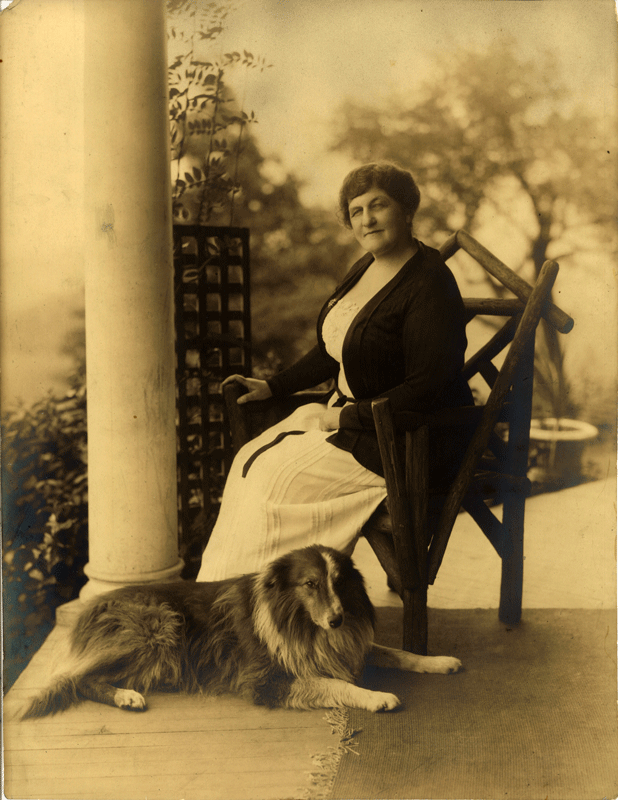MAJOR I. McCREIGHT, 94, LOCAL PIONEER, DIES
From DuBois Courier-Express,Oct. 13, 1958
"Our First Citizen"
Began Conservation Program In Nation
 Major
I. McCreight, banker, conservationist, collector of Indian lore, friend
of "Buffalo Bill Cody and pioneer resident of DuBois, died at his home
in the "Wigwam", high on a hill just south of the city, at 1:30 this
morning in his ninety-fourth year. He had been ill for the better part
of a year, and last spring spent several months in the hospital. His
passing was peaceful, death coming quietly in his sleep. Major
I. McCreight, banker, conservationist, collector of Indian lore, friend
of "Buffalo Bill Cody and pioneer resident of DuBois, died at his home
in the "Wigwam", high on a hill just south of the city, at 1:30 this
morning in his ninety-fourth year. He had been ill for the better part
of a year, and last spring spent several months in the hospital. His
passing was peaceful, death coming quietly in his sleep.
The son
of John and Elizabeth (Uncapher) McCreight, he was born in Jefferson
County on April 22, 1865. There he received his early schooling. He
spent his entire adult life in DuBois, with the exception of the three
years in the Dakota territory during the '80's,' at which time he
became interested in the Indian lore and history, which provided him
with his avocation and interest throughout the remainder of his life. He
came to DuBois when it was little more than a rough lumbering camp,
seeing it develop through the years into the third class city it is
today. He participated in and helped it in its growth. He was
responsible for the conservation policy of the United States.
M.I.McCreight
was born on the very day of the funeral of Abraham Lincoln in the State
House in Philadelphia. The country had been torn by strife and war, and
the great days of reconstruction were still ahead. The first memory of
the times came to Mr. McCreight five years later, trudging through the
snow to the little country school house, where his first education
began. At the time the country was undeveloped and as he stated in an
history written a few years ago, "The only way we get money for taxes
was to buy sugar and coffee for the older ones--the personal drink was
milk or water. Tools for making timber comprised the gin, cross cut
saw, broad axe and double bit, wedges, cant-hook and maul. Hand spikes
were cut at the job. When the big pines were felled, the first thing
was to climb on top, and cut into the trunk for juggles--when this was
split off, the trunk was turned and the gin came into operation. When
the stick was squared, it was hauled to the creek by oxen, and rafted
to the mill in Pittsburgh."
The days of his youth were ones of
many hardships. There was little money to be had, and everything the
family had was hand and family produced. Food came from the gardens and
from the forest. But there was lots of game, and no hunting laws, so
the family lived well, even though the meat was from the forest, and
the other food came elsewhere than from tin cans.
At the age of
16, the local school had been completed, and M.I.McCreight was sent to
Eastman College in Poughkeepsie--requiring a long train ride through
Philadelphia, New York and up the Hudson. Here he graduated in 1882,
then returned to DuBois--a lumber town of rough structure--a new town
just being developed through the industry of John DuBois and John
Rumbarger. The first job offered he took--a clerk at the Fuller store,
paying the salary of $20 per month. A bit extra was made by clerking in
the evening at the only bank of the little town. This work continued
for three years.
But
in 1885 M.I.McCreight entered upon an adventure which was to bear
influence throughout his life. For he was bitten by the bug of
wanderlust, and in that year he started for the northern Dakota
territory and there came into contact with the Indian tribes and ways
of the West, which taught him the love of nature, the ways of the Red
Man, and motivated many of the future developments of character and
life. He was caught in a blizzard during the following winter, which
took 24 lives. He was caught in an ice-gap, with his pony, at 32
degrees below zero. He came into contact with the 7th cavalry, of
Custer fame, and bought and shipped buffalo bones, fish and frozen
carcasses of deer to the market in St. Paul. He became treasurer for
the James J. Hill Fat Stock Show, and helped shovel the first dirt for
the building of the Great Northern Railroad. He became acquainted with
Chief Waneta of the Indian tribe, and began the collection of Indian
trophies for which he has become nationally famous. When he returned
home two years later, he brought back with him many trophies of his
experiences, and many memories which served him throughout the balance
of his life in the preparation of the several books he subsequently
wrote, and the talks given on the Indian throughout the East. He became
famous for the adventures, and under the Theodore Roosevelt
administration, was considered as a nominee for Indian Commissioner.
But
at the age of 21 he returned to DuBois. At that time he became director
and assistant cashier of the Deposit National Bank, and became the
banker which was to be his vocation for the next fifty years.
At
his wedding, on July 20, 1885, he had as a guest Buffalo Bill Cody,
along with many members of his show, since the Wild West was playing in
DuBois on that day.
M.I.McCreight saw the great fire which
destroyed the major part of DuBois on June 18, 1888, and was one of the
men who subsequently saw it rise again from the ashes. The bank was
destroyed, along with other businesses, and he saw the bank reopen in
the Opera House, which was one of the few buildings in the business
district left standing. The bank was finally reopened in its own
quarters later that year, and Mr. McCreight was engaged in coal and
lumbering operations, and helped to open up this area for both of these
basic industries. He helped develop and open up the Buffalo and
Susquehanna Railroad, later taken over by the Baltimore and Ohio. He
brought the operations of the Erie Railroad into this region.
When
Buffalo Bill returned to DuBois with his show in 1908, he was a house
guest of Mr. McCreight. and it was during this visit that four big
chiefs with the Cody show, in front of the 150 tribal members present,
made M.I.McCreight a Chief of the Tribe. The ceremony, in Sioux
dialect, was conducted by Chief Iron Tail, and Mr. McCreight was
presented with a war bonnet, moccasins and a tepee.
Perhaps the
greatest accomplishment of the life of M.I.McCreight, however, was his
work, which resulted in the saving of the virgin timber in the "Cook
Forest", its acquisition by the public and the private contributions,
and the continued maintenance of it as the only piece of standing
virgin timber. The work on its acquisition was started in 1910, ran
through the next 17 years, cost Mr. McCreight a personal fortune of
$10,000, and was finally brought to fruition during the administration
of Governor Fisher. In this effort he had to lead the drive to raise
$200,000 from the public, as well as to secure the passage of the
necessary legislation in Harrisburg. The Park will stand forever as a
monument to his memory.
The work of M.I.McCreight locally will
keep his name in the forefront as one of the pioneers who had such an
important part in the development of the city. In addition to his work
here, he was interested in national conservation, and it was Mr.
McCreight who wrote the Conservation Policy for Theodore Roosevelt in
1906. In addition he organized the State Conservation Society. He
handled, in his time, two of the largest real estate deals ever
consummated in Pennsylvania and West Virginia.
During the First
World War he was clerk of the local draft board. He served twenty years
as school director, twelve of them as president of the board. He built
the street railway system in DuBois, and the electric plant, later
selling out to the Pennsylvania Electric Company. He built and owned at
one time the Hotel DuBois. He secured the Car Shops for DuBois when the
B.R. & P. railroad came to town. He established the DuBois Brewing
Company, one of the largest and richest breweries in the State today.
For the town, he bought the DuBois Municipal Water Works. He was the
principal promoter for the Buffalo-Pittsburgh Highway, Rte. 219, from
Bradford to Indiana. He was the organizer and first president of the
DuBois Kiwanis Club.
He married Alice B. Humphrey on July 20,
1887, and this summer the couple observed their seventy-first wedding
anniversary. For almost three quarters of a century, Mrs. McCreight had
been at his side, in all his travels which took him to all corners of
the globe.
In addition to his wife who survives him after
seventy-one years together, he leaves the following children: Donald of
Crafton; Jack of Oakmont; Jim of Jacksonville, Fla.; M.I. Jr. of New
Kensington; Mrs. Catharine Stumpf of Zelienople; and Mrs. Martha
Swisher of DuBois.
At press time funeral arrangements had not been completed, although interment will be made in Morningside Cemetery.
Mr.
McCreight was a member of the First Presbyterian Church, one of the
founders of the DuBois Country Club, and a member of many fraternal and
social organizations of the city.
|

 And what does Major I. McCreight have to say today about his wedding day and his wedded life?
And what does Major I. McCreight have to say today about his wedding day and his wedded life? Major
I. McCreight, banker, conservationist, collector of Indian lore, friend
of "Buffalo Bill Cody and pioneer resident of DuBois, died at his home
in the "Wigwam", high on a hill just south of the city, at 1:30 this
morning in his ninety-fourth year. He had been ill for the better part
of a year, and last spring spent several months in the hospital. His
passing was peaceful, death coming quietly in his sleep.
Major
I. McCreight, banker, conservationist, collector of Indian lore, friend
of "Buffalo Bill Cody and pioneer resident of DuBois, died at his home
in the "Wigwam", high on a hill just south of the city, at 1:30 this
morning in his ninety-fourth year. He had been ill for the better part
of a year, and last spring spent several months in the hospital. His
passing was peaceful, death coming quietly in his sleep. morning at
the age of 93, in his home "The Wigwam" just south of this city,
severed one of the few remaining links with not only the early history
of DuBois, but with the development of the western part of our nation
as well.
morning at
the age of 93, in his home "The Wigwam" just south of this city,
severed one of the few remaining links with not only the early history
of DuBois, but with the development of the western part of our nation
as well.